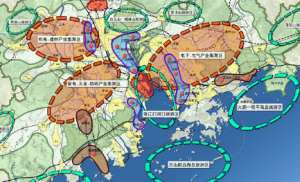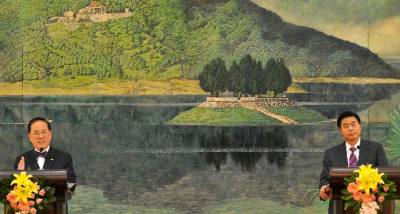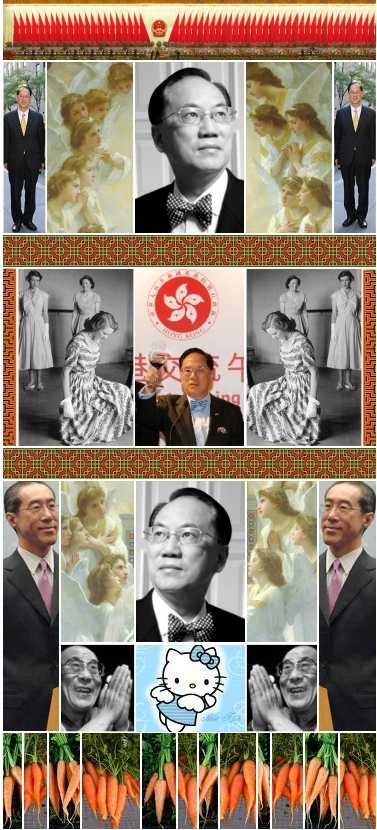In December 2008, the National Development and Reform Commission released the Outline of the Plan for the Reform and Development (not Development and Reform, as you would expect) of the Pearl River Delta. It outlined aims to prioritize, accelerate, vigorously develop, renovate and upgrade, actively develop, promote, facilitate (twice), consolidate, build (thrice), deepen (thrice), reinforce, enhance (thrice), establish, exert, optimize, elevate, advance (thrice), inspire, utilize, energetically develop, intensify, prioritize, perfect, complete, improve, innovate, fully exert, elevate (twice), strengthen and – to the alarm of some elderly maiden aunts – stiffen various things. For example, it announced an intention to construct Harmonious Water Conservancy Projects and engage in Closer Cooperation with Hong Kong and Macao. Many of us were unsure whether we should leap up and down wetting ourselves or contain our excitement in the expectation that even greater thrills were to come.
Those who chose the latter have now been proved correct and had their patience rewarded. Hong Kong’s Chief Executive Donald Tsang and Guangdong’s Governor Huang Huahua have signed a Framework Agreement bringing the two jurisdictions’ co-operation to new heights. As with numerous previous cross-border pacts promising cooperation, partnership and mutual da-dee-da integration, the Framework Agreement is long on vague aspirations and short on specific policies other than some reiterated measures on infrastructure and other projects. However, there is something different about this particular piece of highly wrought blather.
It was signed in the Great Hall of the People in Beijing…
As the Hong Kong government’s statement yesterday breathlessly points out, the Agreement has been endorsed by the State Council and the ceremony was witnessed by Vice President Xi Jinping, who is likely to succeed Hu Jintao in 2012. So this is top-level, rather than purely regional, blather. As the press release says when referring to “important iconic effects,” this is about symbolism, but as we all know symbolism can be important. Essentially, this is a sort of peace treaty imposed by Beijing on the leaders of the Big Lychee and their counterparts in Guangdong.
One of the reasons we are knee-deep in cross-border conferences, councils and declarations is that the two sides don’t really like each other. The mainland officials resent our separate status, with its open market, convertible currency, bulging reserves and freedom from obligations to pay tax to Beijing or adopt and subsidize distant towns struck by natural disasters. The Hong Kong bureaucrats, trained by colonial masters, see the Pearl River Delta cadres as covetous central planners and best avoided.
After feeling humiliated by snooty Hongkongers after 1997, Guangdong officials started to badmouth the Big Lychee’s leadership up in Beijing as uncooperative. As Hong Kong went through economic problems in the early 2000s, the mainland provincial authorities grew more cocky, taunting the upstart, foreign-influenced city to the south with plans to restore Guangzhou to its historic position as the region’s top shipping, trade and financial centre.  One of my most treasured possessions is a semi-official academic document purporting to outline plans to turn the whole Pearl River Delta into a trendy world-class hi-tech, services, eco-tourism, blah-blah zone, complete with a map showing a barren Hong Kong, isolated and forgotten in the middle of all the colour-coded progress and prosperity. And then there was the bickering over cross-border infrastructure – basically over who would benefit and who should pay.
One of my most treasured possessions is a semi-official academic document purporting to outline plans to turn the whole Pearl River Delta into a trendy world-class hi-tech, services, eco-tourism, blah-blah zone, complete with a map showing a barren Hong Kong, isolated and forgotten in the middle of all the colour-coded progress and prosperity. And then there was the bickering over cross-border infrastructure – basically over who would benefit and who should pay.
Whatever his shortcomings as a policymaker, Donald Tsang Kam-yuen has a flair for productive groveling, and since assuming office he has applied this skill with a vengeance across the border. Hong Kong officials have put on a big show of being more sincere, less disdainful and more willing to give their Guangdong counterparts a bit of face. At the same time, the Big Lychee has made visible efforts to be more patriotic – for example, impressing school students to line the streets with flags for the Olympics, or sending cash to Szechuan. We may sneer or shrug, or see a scary trend, but it is what folk across the border expect to see.
So the new-look, positive, constructive, anthem-humming, eagerly integrating Hong Kong can be viewed as a bit of a PR stunt, to win over skeptical mainland leaders hearing bad reports about the ex-colony from their southern provincial bosses. In which case, we need a revisionist treatment of Sir Bow-Tie to portray him as a closet Hong Kong nationalist, appeasing the emperor to win protection for his beloved home town against grasping Guangdong. It would explain how he manages to reconcile devout Catholicism with apparent loyalty to the Communist Party. The upshot: Governor Huang goes to Beijing and publicly signs a fancy bit of State Council-approved Five-Year-Plan blather affirming Hong Kong as the financial centre. If he’s lucky, his sweatshops and duck farms might get a film studio.



Why does Sir Don go in for these ritual humiliations? The more important people always stand or sit on the left in Chinese Communist Party culture so he always looks a dweeb. And how high was the box he was standing on?
From the link: “Hong Kong has been the `Eastern Hollywood,’ so it is possible to sell travel packages linked to famous movie scenes in Hong Kong, such as Wing Lee Street in Echoes of the Rainbow,” he said.
Tse said it would also increase the number of visitors from Guangdong, benefiting sectors such as catering and retail”.
Tse needs to put down the bong he’s holding, as if…… I’m tired of the naked greed where every decision made by Government needs to flow into the coffers of such august , important and upstanding groups such as the catering and retail sector.
The last thing from Guangdong to accelerate and energetically develop in Hong Kong was ….SARS.